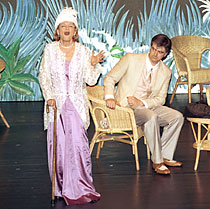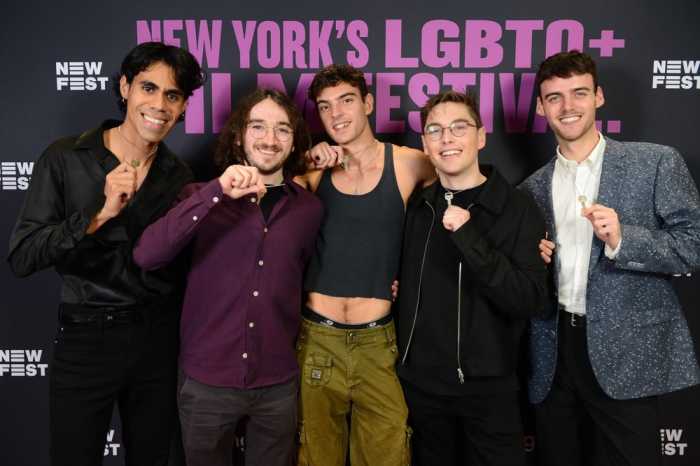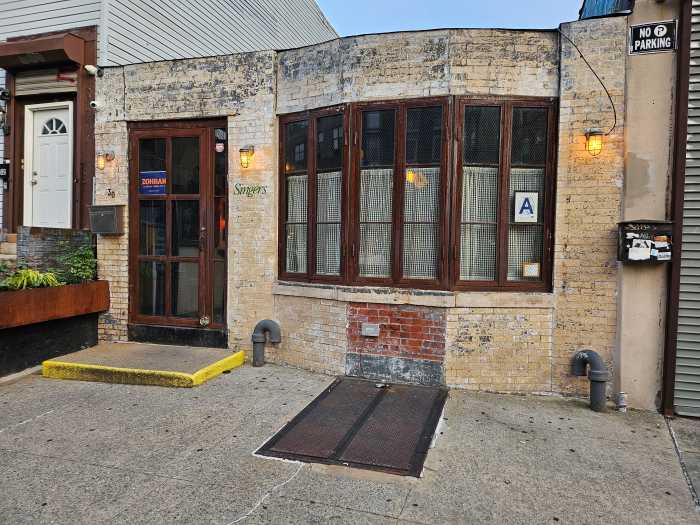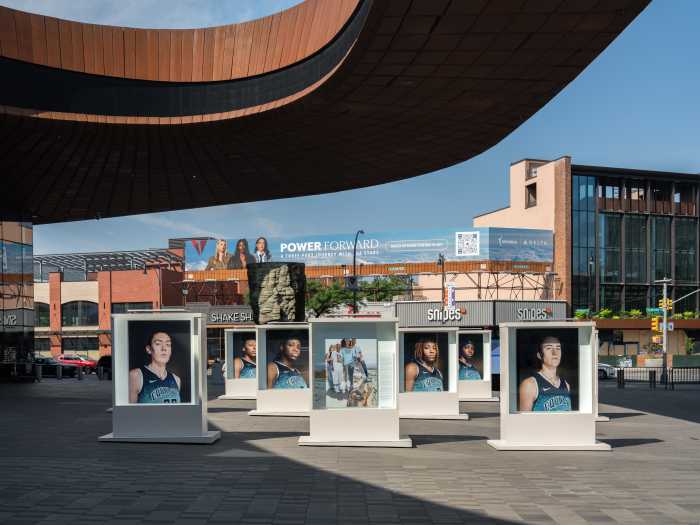"We all use each other and that’s
what we think of as love," says Catherine Holly in Tennessee
Williams’ "Suddenly Last Summer," The Sackett Group’s
inaugural show at the Brooklyn Music School Playhouse.
Indeed there’s a lot of using in this play, but not too much
love.
First produced in 1959 as "Garden District" (a section
of New Orleans), a double-bill that also featured Williams’ short
play "Something Unspoken," "Suddenly Last Summer"
is a mature work that came after many masterpieces – "The
Glass Menagerie" (1944), "A Streetcar Named Desire"
(1947), "Summer and Smoke" (1948), "The Rose Tattoo"
(1951) and "Cat on a Hot Tin Roof" (1955). So, there
are in "Suddenly Last Summer," all of Williams’ usual
culprits – the overpowering older woman, the vulnerable, sexually
repressed young lady, the boorish relative.
But in this production, directed by Robert J. Weinstein, the
most important character, Sebastian, the effete son of the rich
widow Mrs. Venable (Dorothy Stasney), never appears on stage
(except as a wire sculpture of the martyred St. Sebastian). He
has died in Europe months before under traumatic circumstances
only known to his traveling companion, his distressed and distraught
cousin, Catherine Holly (Ellen Lindsay).
Mrs. Venable goes to great lengths to keep those circumstances
hidden, even confining Catherine to a mental institution and
calling in a doctor whom she attempts to bribe into performing
a lobotomy on her niece. Catherine’s plight is complicated by
her avaricious mother (Diane Lynne Drew) and boorish brother,
George (David Sochet), who want her to keep her mouth shut so
Sebastian’s will can be executed without a hitch and the Hollys
can receive their inheritance.
"Suddenly Last Summer" unfolds much like a mystery
(without the action) as the truth is slowly uncovered. On stage,
the first half of the play is dominated by Mrs. Venable, who
attempts to cajole and bully Dr. Cukrowitz (Matthew Healy) into
submitting to her will. At the same time she creates a pretty
good picture of the unusual and unhealthy relationship she once
had with her son. The second half is dominated by Catherine,
who is at last allowed to tell the real story behind Sebastian’s
death.
In the 1959 movie, these two vital roles were played by Katherine
Hepburn (who, ironically, so disliked the light in which director
Joseph L. Mankiewicz had cast her that she refused to see the
final cut) and Elizabeth Taylor, both of whom were nominated
for Academy Awards. If Weinstein has not been able to resurrect
Hepburn and convince Taylor to somehow shed 46 years and come
to Brooklyn, he has certainly found two actresses who do a superb
job in recreating these plum roles.
Stasney has a malicious, haughty grace that makes her performance
powerful and convincing. And Lindsay is in total control as she
skillfully contrasts fragility with spunk.
It would be criminal to discuss this production without mentioning
the way set designer John Scheffler has created a lush garden
whose vegetation seems to overwhelm and threaten, or lighting
designer Michael Hairston, whose use of color and varying intensity
is a perfect complement to the set.
Undertaking Williams’ work is certainly a challenge at a time
when sound bites and flashing images dominate the media. This
is especially so for community theater with its limited resources.
In the first place, the nature of his plays demands accomplished
actors; Williams’ plots often center on an action that took place
long before the actual time of the play, which focuses on solving
interpersonal conflicts. And his dialogue, although lyrical and
highly emotional, is also lengthy and sometimes obscure.
In the second place, Williams’ plays demand an audience willing
to listen, to explore, to use and stretch its imagination, to
understand passion without seeing explicit sex scenes and violence
without witnessing bloodshed.
Weinstein has definitely been blessed with the first. Hopefully
this run will prove that he has also been favored with the latter.
The Sackett Group’s production of "Suddenly
Last Summer" plays through Aug. 7, Thursdays through Saturdays
at 8 pm, and Sundays at 5 pm, at the Brooklyn Music School Playhouse
(126 St. Felix Street. at Lafayette Avenue in Fort Greene). Tickets
are $19. Call SmartTix (212) 868-4444 or visit www.smarttix.com.

























